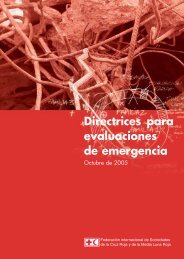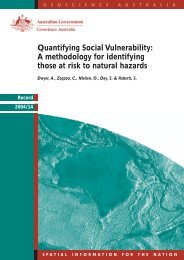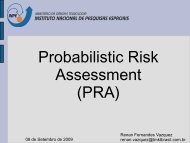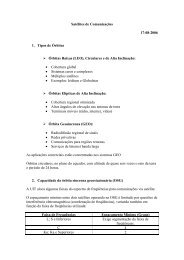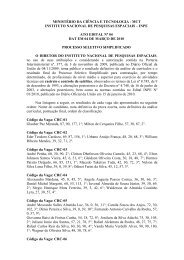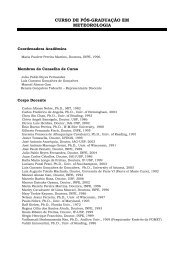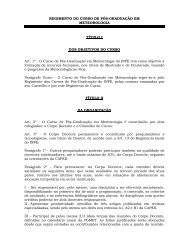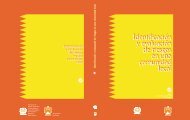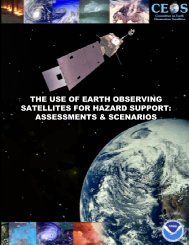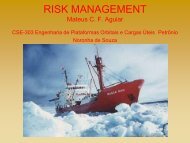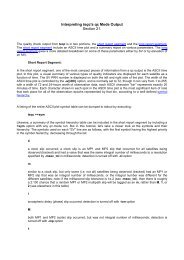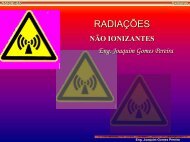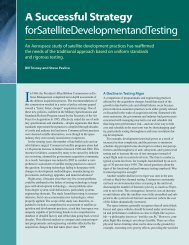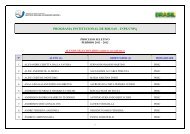Living with Risk. A global review of disaster reduction initiatives
Living with Risk. A global review of disaster reduction initiatives
Living with Risk. A global review of disaster reduction initiatives
You also want an ePaper? Increase the reach of your titles
YUMPU automatically turns print PDFs into web optimized ePapers that Google loves.
Annexes<br />
a2<br />
Disaster Management Center, University <strong>of</strong> Wisconsin, USA.<br />
The center’s goal is to help improve the emergency management performance <strong>of</strong> non-governmental organizations, local and national<br />
governments, and international organizations, through a comprehensive pr<strong>of</strong>essional development program in <strong>disaster</strong> management.<br />
Distance learning is the principal approach for this international program. http://dmc.engr.wisc.edu/about/edlinks.html<br />
Disaster Management Facility (DMF), World Bank, Washington D.C., USA<br />
DMF aims to reduce human suffering and economic losses caused by natural and technological <strong>disaster</strong>s. Making sure that <strong>disaster</strong> prevention<br />
and mitigation are integral parts <strong>of</strong> development requires action, the DMF takes action by providing technical support to World<br />
Bank operations, promoting capacity-building, and establishing partnerships <strong>with</strong> the international and scientific community working on<br />
<strong>disaster</strong> issues. http://www.worldbank.org/dmf/mission.htm<br />
Disaster Management Institute <strong>of</strong> Southern Africa. (DMISA), South Africa<br />
DMISA is an organisation where everyone involved in Disaster Management can relate to others <strong>with</strong> similar interests, and creates<br />
opportunities for the improvement <strong>of</strong> <strong>disaster</strong> management in Southern Africa.<br />
http://www.cmc.gov.za/pht/DMISA.htm<br />
Disaster Management Technical Council (CTGC), Mozambique<br />
The CTGC provides technical back-up to the National Disaster Management Institute (INGC), an autonomous institution under<br />
the Ministry <strong>of</strong> Foreign Affairs and Cooperation.<br />
Disaster Management Unit, (DMU), Standing Office <strong>of</strong> the Central Committee for Flood and Storm Control<br />
(CCFSC), Vietnam<br />
The Vietnam Disaster Management Unit (DMU) is the mechanism chosen by the Government <strong>of</strong> Vietnam and<br />
UNDP to join together over 1000 years <strong>of</strong> Vietnamese flood protection culture <strong>with</strong> twenty-first century western<br />
technology to better protect the entire population <strong>of</strong> Vietnam against the annual natural <strong>disaster</strong>s that ravage the<br />
country. http://www.undp.org.vn/dmu/index.html<br />
Disaster Recovery Business Alliance (DRBA)<br />
DRBA is an organization, a process and a product that is designed to provide an improvement in a community’s ability to deal <strong>with</strong> <strong>disaster</strong><br />
recovery by the formation <strong>of</strong> an effective alliance between the private and public sectors <strong>of</strong> a community. It <strong>of</strong>fers a tested model to<br />
assist local leaders in forming and facilitating a lifeline-based planning organization to serve a local community. It was established and<br />
funded by the Electric Power Research Institute (EPRI) and co-founded by the Department <strong>of</strong> Energy, and the Association <strong>of</strong> Contingency<br />
Planners (ACP). DRBA has formed partnerships <strong>with</strong> many public and private sector organizations such as the Central United<br />
States Earthquake Consortium (CUSEC), National Emergency Management Association (NEMA), the Institute for Business and<br />
Home Safety (IBHS) and many others. http://www.acp-international.com/drba/<br />
Disaster Research Center, University <strong>of</strong> Delaware, USA<br />
DRC, is a social science research center devoted to the study <strong>of</strong> <strong>disaster</strong>s. It was established at Ohio State University in 1963 and moved<br />
to the University <strong>of</strong> Delaware in 1985. The center conducts field and survey research on group, organizational and community preparation<br />
for, response to, and recovery from natural and technological <strong>disaster</strong>s and other community-wide crises. DRC researchers have carried<br />
out systematic studies on a broad range <strong>of</strong> <strong>disaster</strong> types, including hurricanes, floods, earthquakes, tornadoes, hazardous chemical<br />
incidents, plane crashes. http://www.udel.edu/DRC/nodhtml.html<br />
Drought Monitoring Centre (DMC), Harare, Zimbabwe and Nairobi, Kenya<br />
The Drought Monitoring Centres (DMCs) for Eastern and Southern Africa are charged <strong>with</strong> the responsibility <strong>of</strong> monitoring <strong>of</strong><br />
drought and other climatic conditions in a timely manner <strong>with</strong> respect to intensity, geographical extent, duration and impact upon agricultural<br />
production and to give early warning for the formulation <strong>of</strong> appropriate strategies to combat any anticipated adverse effects.<br />
http://www.meteo.go.ke/dmc/contact.html http://lion.meteo.go.ke/dmc/<br />
e<br />
Earthquake Disaster Mitigation Research Center (EDM), Miki, Japan<br />
The main purpose <strong>of</strong> the EDM is to produce “Frontier Research on Earthquake Disaster Mitigation for Urban Regions.” The major<br />
research activities are performed by three research teams: the <strong>disaster</strong> process simulation team, the <strong>disaster</strong> information system team and<br />
the structural performance team. http://www.edm.bosai.go.jp/english.htm<br />
Earthquake Engineering Research Institute (EERI), Oakland, California, USA<br />
The objective <strong>of</strong> EERI is to reduce earthquake risk by advancing the science and practice <strong>of</strong> earthquake<br />
engineering, by improving understanding <strong>of</strong> the impact <strong>of</strong> earthquakes on the physical, social, economic,political and cultural environment,<br />
and by advocating comprehensive and realistic measures for reducing the harmful effects <strong>of</strong> earthquakes. http://www.eeri.org/<br />
349



